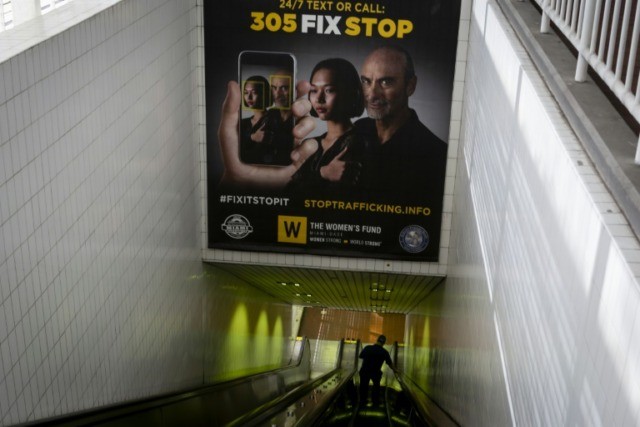Miami (AFP) – Every year, the American football season ends with the vast spectacle of the Super Bowl, drawing in celebrity superstars, hugely expensive advertising and 100 million viewers.
But the sporting mega-event also has a darker side: a spike in human trafficking, in particular a rise in sexual exploitation.
This year, Miami will host the Super Bowl on February 2, but the party city in southern Florida — already the state with the third highest rate of human trafficking in the country, after California and Texas — worries that the combination of the huge sporting event in proximity to its world-famous beaches and clubs will create a perfect storm of sex trafficking.
“The Super Bowl is going to expand that as you have party events, large events like this, it will attract these organizations to try to come here to try to make more money,” said Anthony Salisbury, head of security investigations at the Department of Homeland Security.
That was the experience of Katariina Rosenblatt, who was forced, from the ages of 13 to 17, to have sex with paying clients in a hotel in the tourist hub of Miami Beach.
“I was sold for my innocence as an American virgin girl, but I got out of trafficking,” said Rosenblatt, who went on to found an NGO called “There Is Hope For Me” to help victims of sex trafficking.
She said that sex tourists came “from other places to Miami Beach to purchase sex.”
– Look out for signs –
The city’s authorities are training hotel workers, security guards, Uber drivers and truckers to spot the signs that a person might be a victim of trafficking, since these are the people most likely to cross paths with them and have a chance to alert police.
If a guest has an unusual number visitors to their hotel room, if they ask for a room close to the stairs, if they refuse to let the cleaners in or have poor personal hygiene, if they arrive with very little luggage or are constantly asking for the minibar to be restocked, these can all be telltale signs that something is amiss, police say.
“Whether it’s nervous behavior, failure to make eye contact, sometimes victims will not answer without looking to someone before they answer, as if they’re looking for permission,” said Ashley Moody, Florida’s Attorney General.
She also said attention should be paid to tattoos, which can indicate a victim is the “property” of a trafficker. A number of a people with same tattoo should also flag suspicions.
The organizers of the Super Bowl are participating in efforts to raise consciousness about trafficking.
– Public shaming –
The problem was highlighted in February 2019 when Robert Kraft, the owner of the New England Patriots football team, who went on to win the Super Bowl last year, was caught up in a case of sex trafficking.
The 78-year-old multi-millionaire visited a Florida massage parlor which was under police surveillance for selling sexual services in the days running up to the Super Bowl. Kraft has professed his innocence and his case is still in the courts.
The media spotlight on the case exposed the problem of sex trafficking in the Sunshine State and sparked an aggressive campaign to tackle it.
Miami’s train stations and airport bear somber posters showing a middle-aged man and a teenager with the message: “Not What You Think” alongside an emergency telephone number.
Other posters, depicting a man posing for a police mug shot, warn: “Buy sex. Be exposed.”
That refers to a new law that came into effect this month and which requires that police photographs and the personal information of anyone arrested for soliciting prostitution in Florida should appear in an online registry for all to see.
“It’s certainly all hands on deck,” said the attorney general.
According to the International Labour Organization, 40 million people worldwide are currently forced into modern slavery, almost five million of them in forced sexual exploitation.
Salisbury said 50 people were arrested last year by federal authorities in Florida for sex trafficking. But the special agent warned the actual number of cases could be much higher as they are hard to prosecute and perpetrators are often charged with other offenses that are more likely to result in a conviction.

COMMENTS
Please let us know if you're having issues with commenting.